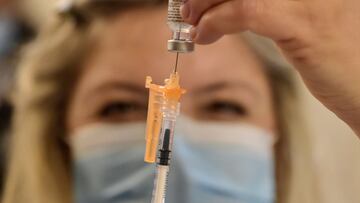Why does the covid-19 vaccine require more than one shot?
It’s common for a vaccine to require two doses spread apart, giving the body time to respond. How do the covid vaccines work and why do you get two doses?

Both FDA-approved vaccines, made by Pfizer / BioNTech and Moderna require two shots, several weeks apart. For Pfizer it’s 21 days later, and with Moderna’s the second dose is given 28 days later.
Many of the most common life-saving vaccines require two shots, including measles, mumps and rubella (MMR), the human papillomavirus (HPV), hepatitis B and some, like the rabies vaccine even needs three doses to provide adequate protection.
How does the body fight infection?
Our bodies fight illness through our blood cells. Blood contains both red cells and white cells - the ones which fight infection. Different types of white blood cells fight infection in different ways:
- Macrophages are white blood cells that swallow up and digest germs and dead cells. They leave behind parts of the invading germs called antigens. The body identifies antigens as dangerous and stimulates antibodies to attack them.
- B-lymphocytes are defensive white blood cells. They produce antibodies that attack the pieces of the virus left behind by the macrophages.
- T-lymphocytes are another type of defensive white blood cell. They attack cells in the body that have already been infected.
According to CDC guidelines, the first time a person is infected with the virus that causes covid-19, it can take several days or weeks for their body to make and use all the germ-fighting tools needed to get over the infection. After the infection, the person’s immune system remembers what it learned about how to protect the body against that disease.
The body keeps a few T-lymphocytes, called memory cells, that spring quickly into action if the body encounters the same virus again. When the familiar antigens are detected, B-lymphocytes produce antibodies to attack them. Experts are still investigating how long these memory cells protect a person against the virus that causes covid-19.
How do the coronavirus vaccines work?
I highly recommend these VRBPAC documents. There are so many amazing facts in here. One striking finding is this figure. People who received the Pfizer vaccine are protected from #COVID19 as early as 12-13 days post first dose (likely reflecting ⬆️ in antibody response)👇🏽(1/n) https://t.co/ubbG6fg1Bj pic.twitter.com/F3JcVkq7zZ
— Prof. Akiko Iwasaki (@VirusesImmunity) December 8, 2020
Covid-19 vaccines help our bodies develop immunity to the virus that causes covid-19 without us having to get the illness. Different types of vaccines work in different ways to offer protection, but with all types of vaccines, the body is left with a supply of “memory” T-lymphocytes as well as B-lymphocytes that will remember how to fight that virus in the future.
The Pfizer and Moderna vaccines both use mRNA vaccines, which contain material from the virus that causes covid-19 that gives our cells instructions for how to make a harmless protein that is unique to the virus.
After our cells make copies of the protein, they destroy the genetic material from the vaccine. Our bodies recognize that the protein should not be there and build T-lymphocytes and B-lymphocytes that will remember how to fight the virus that causes covid-19 if we are infected in the future.
It typically takes a few weeks for the body to produce T-lymphocytes and B-lymphocytes after vaccination. Therefore, it is possible that a person could be infected with the virus that causes covid-19 just before or just after vaccination and then get sick because the vaccine did not have enough time to provide protection.
Sometimes after vaccination, the process of building immunity can cause symptoms, such as fever. These symptoms are normal and are a sign that the body is working to defend us against the infection.
Why do the coronavirus vaccines require two shots?
Both approved coronavirus vaccines being rolled out across the US and the world are only proven to be as effective when administered twice, several weeks apart. The first shot starts building protection, allows the immune system and white blood cells to identify and attack the virus. A second shot a few weeks later is needed to get the most protection the vaccine has to offer.
Two doses is the proven way to ensure these vaccines are as effective as possible. It gives the body a chance to create sufficient antibodies and memory cells, but the requirement poses logistical problems. It means twice as many materials — needles, vials, the vaccine itself — need to be produced, stored, and distributed.
It’s also more difficult to get people to get a vaccine twice. For example it could be difficult for people to take time from work, or travel some distance to the nearest vaccination site. There has been concern that if side effects are experienced by patients following the first dose of the vaccine, it could be difficult to get people to return for the all-important second dose.
Related stories
In fact, Vox is reporting that as many as 50% of vaccine recipients could skip the second dose of the vaccine. It says that with the hepatitis B vaccine — which, like the covid-19 vaccines, is supposed to have around a one-month period between the first and second doses — only roughly 50% of patients went to get their follow-up shot within a year after their first.
Finally, it may be that some time next ear the Johnson & Johnson vaccine which is under development could also be FDA approved, which only requires a single dose.
